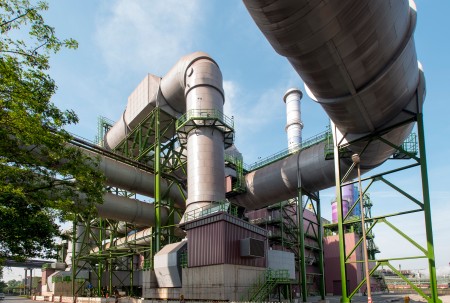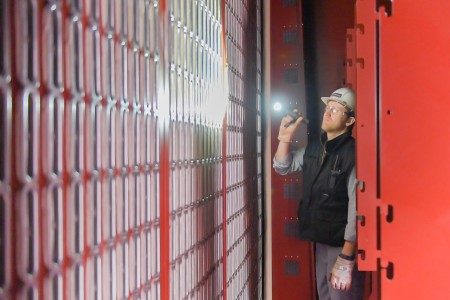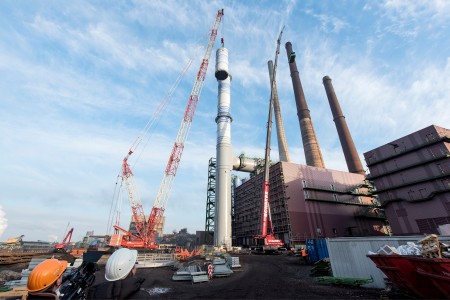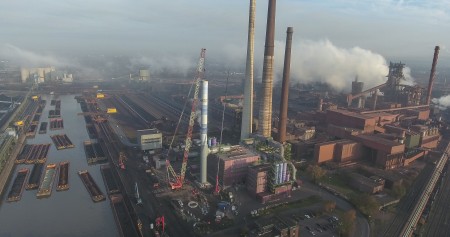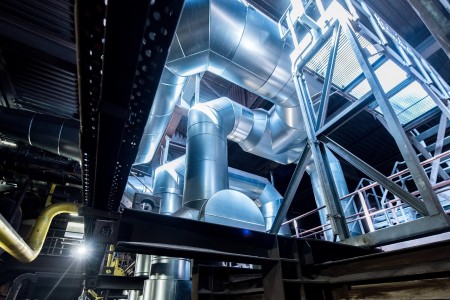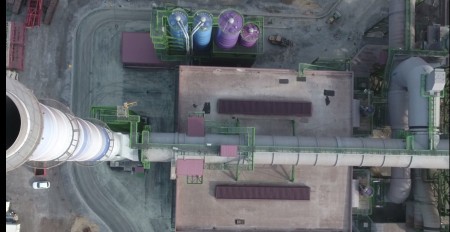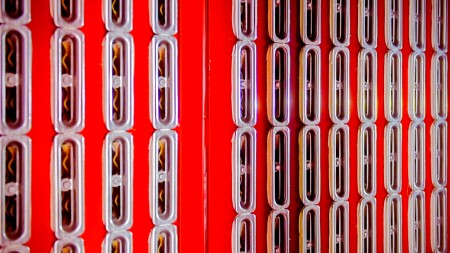Daily press, Trade press, 2017-05-15, 02:00 pm
Further improvement to environment in Duisburg: World’s biggest fabric filter for sinter production starts operation at thyssenkrupp
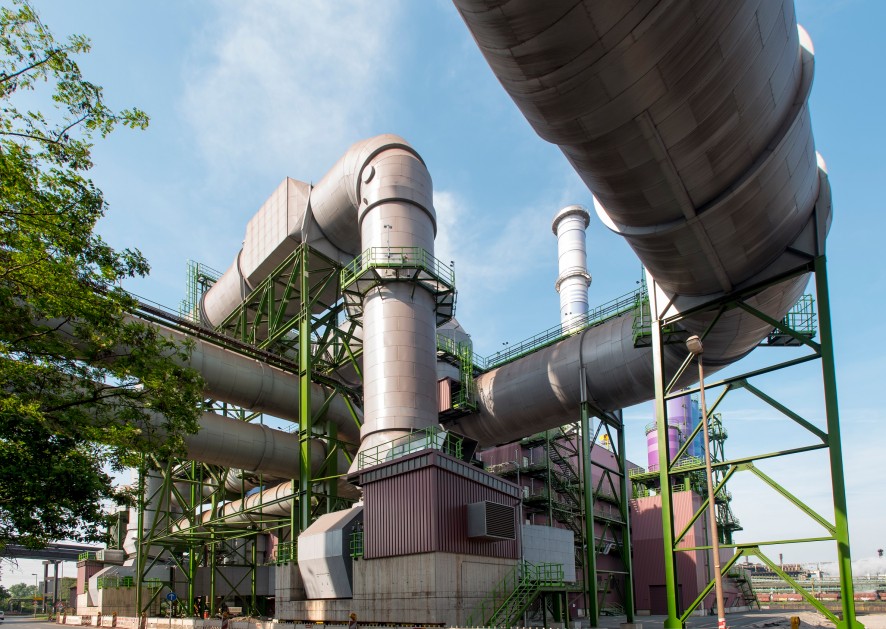
The waste air from sinter belt 3 in Duisburg-Schwelgern flows through more than 44,000 extremely fine filter bags, each almost three meters long. The total fabric area of over 45,000 square meters captures tiny dust particulates. Construction project manager Carsten Rokitt says: “The air that comes out at the end of the process is cleaner than the air we breathe on the streets of big cities.” The start-up of the world’s biggest and most advanced fabric filter for sinter production is a big step forward for the environment in Duisburg. This additional waste gas cleaning process further reduces dust emissions in the area around the steel site substantially. thyssenkrupp’s steel division has invested 46 million euros in this project alone. With additional upgrades to other sinter plant equipment in Schwelgern, the total investment package including the new filter unit comes to around 65 million euros.
Iron ore and coke are baked into a “sinter cake”
In a sinter plant, fine iron ores are mixed with coke and other materials such as lime, heated and baked together. The “cake” is cooled and then crushed. Because of its high gas permeability the finished sinter is ideal for charging in the blast furnace, where it is melted together with other materials to produce pig iron. To make the cake, air is sucked through the ore/coke mix, picking up dust. At present the dust is captured by several conventional electrostatic precipitators and prevented from escaping into the atmosphere. “Our electrostatic precipitators are already very efficient. But to capture the dust that still remains after this process we have installed a downstream fabric filter,” says Carsten Rokitt, who is responsible for the sinter line at thyssenkrupp Steel Europe. “This additional filter achieves a further significant reduction in dust emissions and helps meet our goal of keeping the environment clean.”
Particulates captured almost entirely
The sinter plant on the site in northern Duisburg comprises three sinter belts on which a mixture of ore and coke is baked together. A downstream fabric filter for the smallest of the three belts went into operation in fall 2011. By 2014, dust emissions from the steel plant were already roughly 20 percent lower than in 2010. The new 32 meter tall fabric filter has been installed for the biggest of the three belts. Air that has already passed through the upstream electrostatic capacitator now flows through tens of thousands of extremely fine fabric bags which capture even particulates. The new unit can clean up to 1.3 million cubic meters of waste air an hour. “In this way we now capture virtually all the sinter dust. The air emerging from the filters is really clean, and that means less dust in Duisburg and the surrounding area,” says Andreas Theuer, head of Environmental and Climate Protection at thyssenkrupp Steel Europe.
Third filter to be installed by 2020
Encouraged by its good experience with the first fabric filter, thyssenkrupp’s steel division equipped the new filter with the same technology. A third fabric filter for the remaining sinter belt is currently being planned and is scheduled to come on stream by 2020. “These measures will enable us to capture significantly more dust,” says Theuer. “So we expect this to have a big impact on reducing air pollution and take us a big step toward further improving the air quality in Duisburg. You could say this is an investment to improve the quality of life of local citizens.”
Further measures to modernize the sinter plant in Schwelgern
In addition to the installation of the advanced fabric filter, further measures have been carried out to upgrade equipment at the sinter plant in Schwelgern. They include repairs to pipelines and the coke breeze bunker as well as improvements to the sinter belts. “Operations continued while the work was being carried out. Despite this difficulty, with the help of many employees we were able to complete the project on schedule,” says Rokitt. “We now have one of the most advanced sinter plants here in Duisburg.”
New 100 meter stack for the fabric filter
Construction of the new fabric filter included the installation of an almost 100 meter tall stack. The 400 ton giant was transported to the site by ship in four segments. A special crane was used to assemble the blue striped stack. Prior to this, large-size components with an overall weight of several hundred tons had been delivered for the new dust filter. They included segments that were 27 meters long and almost six meters in diameter. After arriving at the port in Schwelgern, the steel parts for the stack were unloaded and assembled on site. The enormous height of the stack meant that the boom of the 70 meter special crane had to be additionally lengthened. The new stack, which is barely visible from outside the thyssenkrupp site, replaces a 250 meter brick tower.
Iron ore and coke are baked into a “sinter cake” for the blast furnace
Before charging in the blast furnace, fine iron ores first have to be converted into lump form in a sinter plant. In the sintering process, a mixture of fine ores, coke and additives such as lime is placed on a sinter belt, ignited under a furnace at temperatures of around 1,200 degrees, and sintered. The combustion air required for the process is sucked through the mixture by large fans to burn the coke. At the end of the sinter belt the “cake” is removed, cooled and crushed to an average particle size of around 20 millimeters, referred to in the industry as “lumps”. From the Schwelgern sinter plant with its three sinter belts the material is supplied to the four blast furnaces of thyssenkrupp Steel Europe in the north of Duisburg.
Further information:
https://www.thyssenkrupp-steel.com/en/newsroom/highlights/fabric-filter.html
